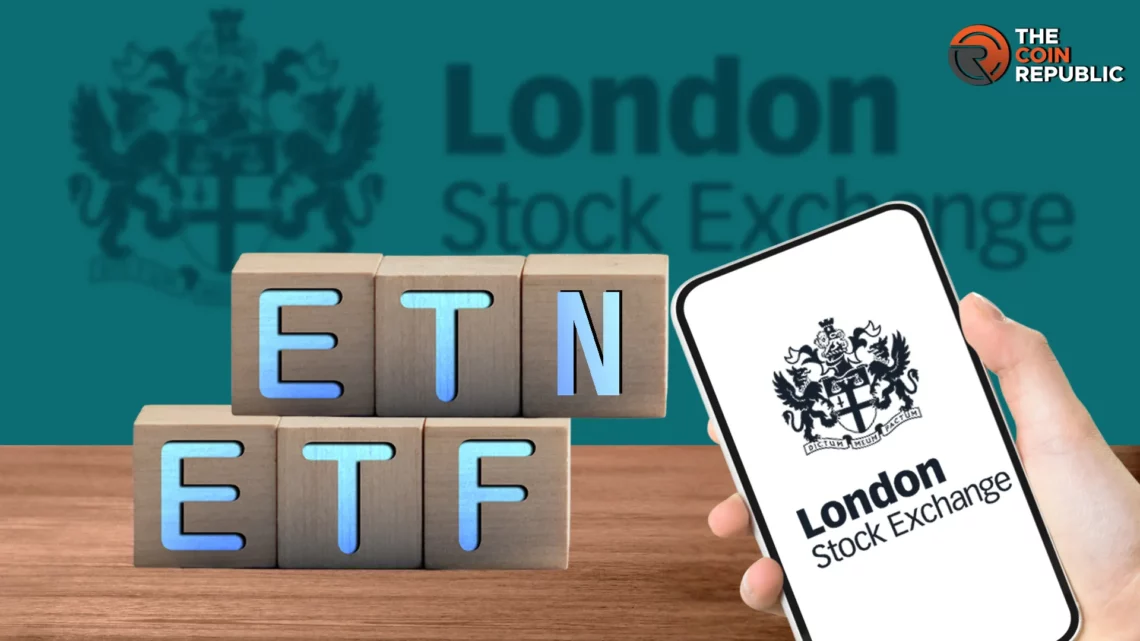London Stock Exchange has announced acceptance of applications for the approval of ETNs in the regulated market.
Exchange Traded-Notes (ETNs) are types of unsecured debt securities that track an underlying index of securities and trade like stocks on major crypto exchanges. ETNs are like bonds without interest payments and their prices fluctuate like stocks.
These ETN values will rise and fall in line with the underlying crypto assets, subject to the deduction of fees and expenses. It gives investors exposure to the changing value of underlying crypto assets without critically holding the crypto assets themselves.
It appeals to investors who do not wish to invest directly in crypto assets, manage wallets or transact on unregulated crypto exchanges.
The crypto exchange-traded notes have gained popularity in recent years, with a steadily increasing range of features and underlying crypto assets being introduced in the market.
The performance and movements of most crypto assets are volatile; however, the stance on ETNs changed with the approval of the spot BTC ETF in the USA.
Applications for Bitcoin and Ether exchange-traded notes
The London Stock Exchange (LSE) announced that it will start accepting applications for Bitcoin and Ether exchange-traded notes (ETNs) in the second quarter of 2024.
The crypto ETN Admission Factsheet outlines the requirements for these products, and LSE has released the details. The processed ETNs for review need to be backed by Bitcoin or Ether. These products further need to be unleveraged and should have a publicly available market price or value measure.
However, the London Stock Exchange has not announced the exact date for accepting applications. No major financial institutions have confirmed whether they will be applying for ETNs or not. They might respond once LSE opens the acceptance of applications.
As per the submitted factsheet, the underlying crypto assets must be “principally or wholly” stored in cold wallets or similar storage by custodians following Anti-Money Laundering (AML) laws in the European Union, United Kingdom, Switzerland, or the United States.
The Financial Conduct Authority (FCA) stated it will not contradict Recognised Investment Exchanges (RIEs) building market segments for crypto-backed exchange-traded notes.
The regulator signified that these products are aimed at professional investors, such as credit institutions and investment firms authorized or regulated to function in financial markets.
ETFs for Bitcoin have already been introduced and Ethereum ETFs are under approval from the Securities and Exchange Commission (SEC). Amid all these developments of products, Bitcoin and Ether ETNs are a new category and may open up new opportunities for investors.
Comparing ETNs and ETFs
Exchange-traded notes, abbreviated as ETNs, are unsecured debt securities that track their values from an underlying index and trade on major exchanges like stocks.
The financial institutions issue ETNs with a maturity date, and the repayment of the principal depends on the issuer’s financial viability. However, ETN does not make periodical interest payments but rather provides returns based on the performance of the underlying.
US-based financial services firm, Fidelity Investments, has shared advice with the investments for comparing ETFs or ETNs, stating,
“The decision of whether to opt for an ETF or ETN in the same product area depends largely on your investment time frame. Given that ETFs are subject to yearly capital gain and income distributions which are taxable events to the holder—and ETNs are not—it seems reasonable to conclude that ETNs are a superior product for the long-term investor.”
Fidelity Investments has said that ETNs may be considered an ironic investment because of the way they offer tax advantages. However, they also witness a significant risk as they provide access to more niche product areas, which are not recommended as staples for long-term investors.
ETFs and ETNs both track underlying benchmarks and trade on exchanges. They have multiple differences. ETFs are similar to mutual funds in that they facilitate asset holdings, including stocks or commodities. These assets derive the prices of ETFs.
Investment in the ETF allows ownership of a diversified asset block. Whereas ETNs are debt securities that guarantee to pay the index’s value at maturity, excluding fees. It exposes investors to the risks related to issuers.
Advantages of ETFs over ETNs
ETFs offer several advantages over ETNs, such as greater tax efficiency, as taxes are only charged upon sale. ETFs provide instant diversification by dividing the total investments into a basket of assets, reducing unsystematic risk for investors.
Their expense ratio is also lower in comparison to actively managed mutual funds, making them cost-effective. Dividends in ETFs are also reinvested immediately and they offer liquidity and flexibility for trading. Further, ETFs have lower tracking errors than ETNs.
Advantages of ETNs over ETFs
In contrast, ETNs are preferred for investors who want exposure to specific indices or assets not available through investments in ETFs.
ETNs are highly tax-efficient for specific strategies, including short-term trading, as taxes are incurred only upon sale. However, ETNs expose investments to credit risk tied to the issuer’s financial stability, which an investor should consider.
Conclusion: Development of Crypto ETN
The introduction of crypto ETNs on the London Stock Exchange will have both positive and negative implications for the crypto landscape. It depends on one’s perspective on decentralization and regulation.
The development of crypto ETNs and their adoption by major financial institutions mark steps towards the mainstream adoption and legitimization of cryptocurrencies. It will attract more institutional investors to the crypto market. This mode will also be a safer and more accessible entrance for investors who are hesitant to invest directly in cryptographic assets.
FAQs
Q. What is increasing adoption in the crypto space?
The involvement of traditional financial institutions in the crypto markets is attracting more investors to the space.
Q. Will ETNs increase regulation on the crypto market?
These will bring crypto assets under the regulatory framework.

Adarsh Singh is a true connoisseur of Defi and Blockchain technologies, who left his job at a “Big 4” multinational finance firm to pursue crypto and NFT trading full-time. He has a strong background in finance, with MBA from a prestigious B-school. He delves deep into these innovative fields, unraveling their intricacies. Uncovering hidden gems, be it coins, tokens or NFTs, is his expertise. NFTs drive deep interest for him, and his creative analysis of NFTs opens up engaging narratives. He strives to bring decentralized digital assets accessible to the masses.


 Home
Home News
News










